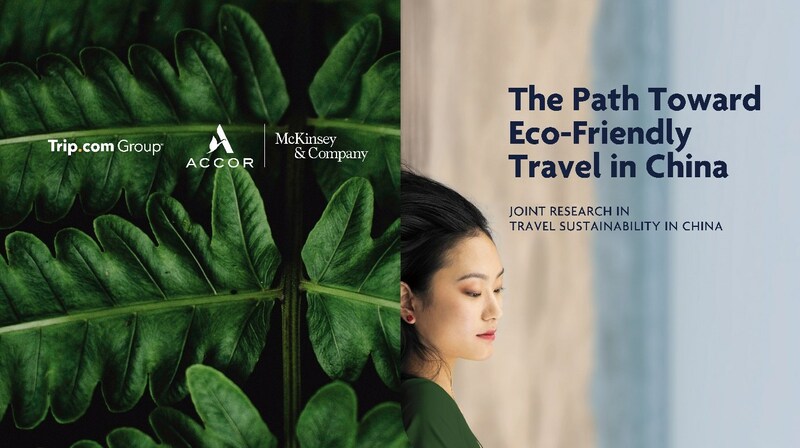Trip.com Group, a leading global travel service provider, in partnership with Accor, a world-leading hospitality group, and global management consulting firm McKinsey & Company, today published a new educational whitepaper that examines the environmental impact of China’s tourism sector, analyses Chinese travelers’ sentiment towards sustainability and ultimately sets out actions key stakeholders in China’s tourism sector need to take to foster sustainable travel. The pioneering survey identifies a series of sustainable changes that ought to be made, from the everyday to the systemic, which can support the travel and hospitality of tomorrow with the intention of becoming an informative industry reference tool for change. The report, entitled “The path toward eco-friendly travel in China“, proposes that by adopting a set of collaborative measures across the industry value chain, from guests to major global providers, China’s tourism sector could move toward a more sustainable future.

Subscribe to our Telegram channel to get a daily dose of business and lifestyle news from NHA – News Hub Asia!
The world is facing an unprecedented sustainability challenge and the Chinese tourism industry has a significant role in the required transformation of hospitality. According to the World Travel and Tourism Council, China is expected to have the world’s largest tourism market by 2032 and, prior to the pandemic, was already one of the biggest global markets. Analysis for the whitepaper found the environmental impact of China’s travel industry is substantial: tourism represented approximately 6-8% of China’s total carbon emissions in 2019.
Data from McKinsey found that Chinese travelers are engaged about their environmental impact and are starting to seek out sustainable alternatives, but the report found they may need more help understanding where to look. Trip.com Group found that 85% of Chinese travelers rate travel sustainability as important or very important, while 60% are concerned about climate change. However, the paper found, at the same time, that Chinese consumers are not yet used to the idea of paying extra for sustainable travel. As such, it is important to provide travelers guidance regarding sustainability costs, highlighting the industries’ efforts to improve provision of sustainable offerings. This will increase willingness to pay by showing the burden to be shared and that price rises will only be short-term.
In response to this, the report provides guidance on the actions that travelers can take to travel sustainably and to empower their own consumer decisions, including booking sustainable travel options with certified service providers, spending more time in one destination, and cultivating sustainable habits such as changing towels or bed linen less frequently and refusing to use single-use plastics in guest experience. Traveler behavior is just the first consideration the report highlights. Long-term sustainability will be achieved in tandem with initiatives from tourism providers, who hold a responsibility to inspire travelers’ mindset.
The whitepaper sets out a series of suggestions for the hospitality industry to support the Chinese traveler in their understanding of sustainable travel, inspire behavioural change and ultimately support the sector’s journey towards a net positive model, one which gives more than it takes. Such recommendations include using technology platforms to make sustainable travel options more visible online, using labelling to ensure travelers are informed on the environmental impact of their actions, providing incentives to encourage sustainable behavior, and training employees to adopt a sustainability mindset.
While greater traveler awareness and willingness to choose sustainable options combined with tourism providers’ individual adoption of more sustainable practices can help China’s travel sector realize “quick-wins” in sustainable impact, lasting sustainability improvements require collective industry-wide effort. The report concludes as a call to action for the hospitality industry to work together hand in hand to achieve sustainable transformation in China. This collaborative project is a starting point for this collective mindset, as a resource which can be used by guests and industry players alike in a united effort for positive change.
At a press conference held at the iconic Fairmont Peace hotel in Shanghai, to launch the report, top executives from Accor, Trip.com Group, and McKinsey & Company shared their perspectives on sustainable travel in China.
Sébastien Bazin, Chairman & CEO Accor, said: “People and sustainability are at the heart of everything we do. When it comes to sustainability there are no individuals, only collectives, and this paper represents a major step-forward for this collaborative industry approach. Impactful change cannot be made alone; transformation happens together. Traveling across China and around the world responsibly can connect people and Accor is proud to lead this collective journey, supporting local communities, protecting biodiversity, as well as sharing and engaging in more sustainable habits. Sustainability is crucial and we have been so pleased to work with our strategic partner Trip.com Group and trusted advisor and counselor McKinsey on this meaningful sustainability-focused White Paper to continue to drive positive change for our guests, talents and partners.”
Jane Sun, CEO of Trip.com Group, said: “We are thrilled to be leading the charge for sustainable travel and promoting responsible tourism practices in the industry. Our commitment to harmonious coexistence between people and nature has driven us to implement green and environmental protection practices, such as our ‘Green Tourism Goals’, which has already reached millions of global tourists. By collaborating with strategic partners, including Accor and McKinsey & Company, we aim to integrate the social and commercial value of green and environmental protection, creating new business growth opportunities for partners. Our goal is to pave the way for a more sustainable and responsible travel industry.”
Jonathan Woetzel, Senior Partner of McKinsey & Company and Director of McKinsey Global Institute, said: “The Chinese tourism industry is large enough to take the lead in advancing the sustainability agenda. As travelers resume their adventures, each step of their journey presents opportunities to make choices and take concrete actions that could immediately reduce their environmental footprint. But the burden is not on the traveler alone. Long-term change calls for collaboration between actors across the entire travel industry, from hotels and travel agencies to green investors and technology suppliers.”
Source: Trip.com Group

